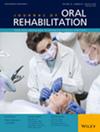Association Between Nutritional Status, Food Form, Appetite and Oral Health at the Time of Admission to a Convalescent Hospital: A Cross-Sectional Study
Abstract
Background
Malnutrition negatively impacts the recovery of physical functions such as activities of daily living (ADL) through rehabilitation. However, older patients requiring rehabilitation are at high risk of malnutrition, making appropriate nutritional management essential for effective and efficient outcomes. Factors associated with the nutritional status of patients admitted to convalescent hospitals have been reported; however, only a few studies have comprehensively examined them.
Objective
To assess the comprehensive relationship between nutritional status and food form, appetite, swallowing function, and oral health status in patients admitted to a convalescent hospital.
Methods
In this cross-sectional study, we included 319 patients (155 male and 164 female; mean age, 74.9 ± 12.2 years) admitted to a convalescent hospital between January and December 2021. ADL, nutritional status (Mini Nutritional Assessment-Short Form), food form (Functional Oral Intake Scale), appetite (Simplified Nutritional Appetite Questionnaire for the Japanese Elderly), swallowing function (Dysphagia Severity Scale), and oral health status (Oral Health Assessment Tool) at admission were retrospectively extracted from medical records. Factors associated with nutritional status were examined through multiple regression analysis.
Results
Over 70% of the participants had nutritional deficiencies, with 58.0% at risk of malnutrition and 18.5% being malnourished. Multiple regression analysis results revealed that ADL, food form, appetite and oral health status were significantly associated with nutritional status at admission.
Conclusion
The findings suggest that good food form, appetite and oral health status on admission to a convalescent hospital may be crucial to realising good nutritional status.


 求助内容:
求助内容: 应助结果提醒方式:
应助结果提醒方式:


